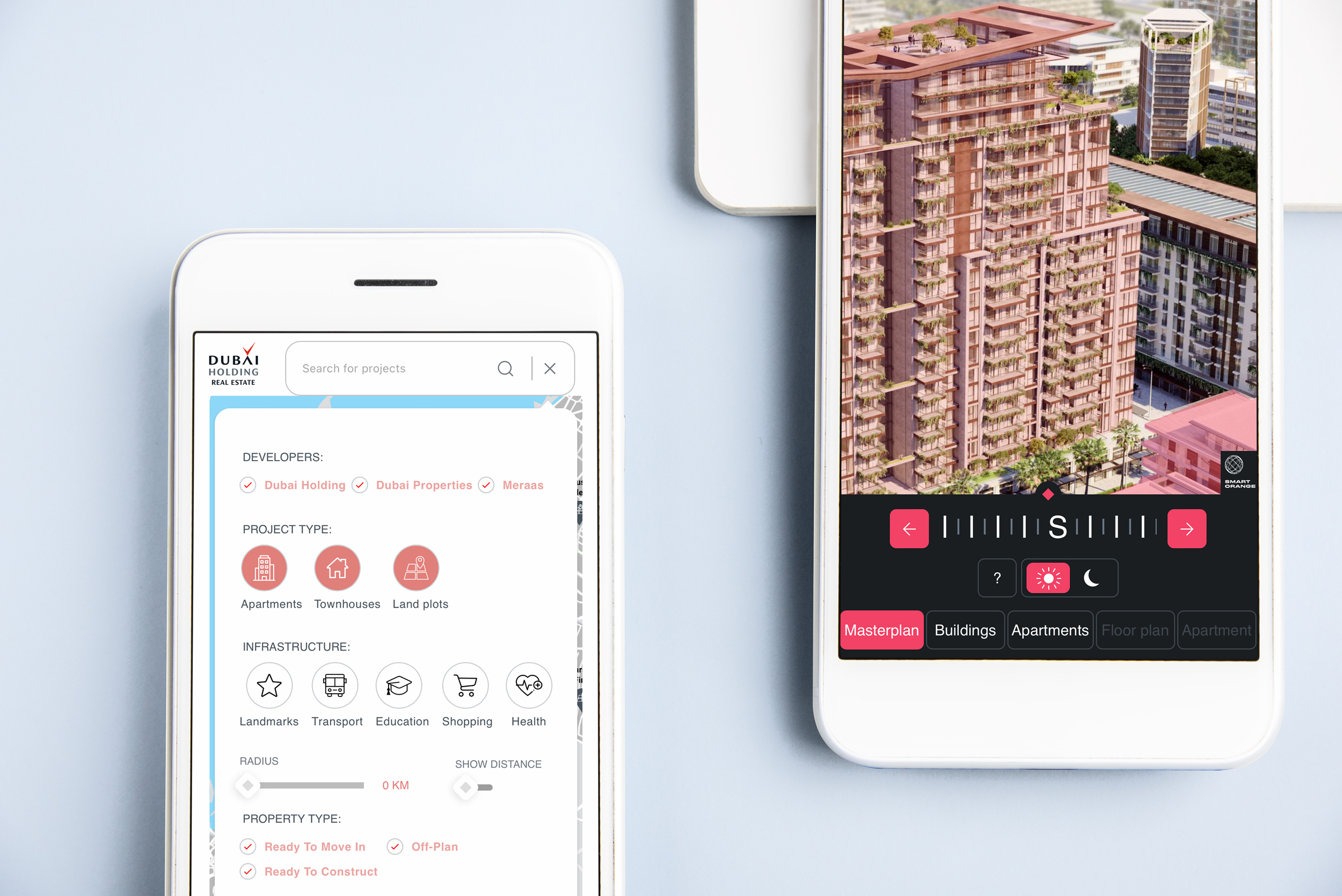
The success and relevance of any business directly depend on the ability to adapt to new technologies appearing on the market. And the real estate industry is no exception.
New trends and techniques are increasingly resonating with customers, especially when it comes to building, selling, or renting a home. This is a result of the fact that a person will always look for more efficient ways when searching for their dream home.
The task of real estate firms is to provide the client with a method of interaction and organization of processes that can give them a feeling of comfort and security. And the best way to do this is to implement new technologies and trends to meet the growing expectations of clients in the real estate industry.
Let’s take a look at the top 10 innovations that are already impacting the industry and will continue to have a significant effect over the coming years.
1. Interactive Masterplan Applications
These applications are especially valuable for salespeople, allowing them to showcase properties both in person and remotely.
The core benefit of the master plan app is that it provides complete information and essential details regarding the property. Clients can get an advantage when searching for a property by setting parameters of budget, amenities, size, etc. In addition, the application allows you to explore the master plan, enjoy 360 virtual walkthroughs, view and zoom the surroundings from different points of view, as well as share information via email or social media, and fill out forms. Thus, master plan solutions noticeably simplify most processes, which makes them one of the main trends.
2. Drones
Today, drones are widely used in various industries. In the case of real estate, these small aircraft are quite helpful, allowing you to visualize and get a bird’s eye view of a location.
When making a purchasing decision, it is important to provide the client with the full picture. Drones are an ideal way to do this, as they give a good idea of the home’s layout, surroundings, and landscape, open up views of hard-to-reach places, and even allow you to assess the condition of the house’s roof and other critical details that are difficult to see through human eyes.
3. Internet Of Things
The Internet of Things is an excellent technology that automates many processes and reduces workload. Moreover, this technology makes the home safer. For example, IoT intercoms are well-encrypted and store video of what is happening around them.
Since IoT connects different devices, allowing them to interact and exchange data, the house becomes more convenient for its owner, which makes such real estate very attractive.
4. Building Information Modeling
BIM are files that can be exchanged, extracted, and networked. They are a useful tool when it comes to real estate decision-making, allowing the parties involved to work together on a building plan. This approach significantly speeds up processes and reduces the risk of errors during the design, construction, and operation of a building.
As a bonus, this technology also allows real estate professionals to work with a larger number of property objects.
5. Smart House
Smart home technology is one of the main innovations in recent years. Conceptually, a smart home is furnished devices that can be configured and controlled remotely. Properties that have these features are especially attractive for people who are often away from home, such as traveling or going on business trips, allowing them to maintain their property even if they are in the other hemisphere. In addition, smart homes can often be controlled using just one master application, which is leading to an increase in demand for such solutions.
6. Artificial Intelligence
AI solutions are a major trend in many industries as this technology can perform complex tasks that require human intelligence, as well as automate processes and speed up all decisions, which is a comprehensive advantage in the real estate industry.
Using artificial intelligence, professionals can have access to all the information about properties, thereby making realistic predictions regarding the future price of an object.
The value of AI is that algorithms can independently learn, make decisions, and solve problems. That’s why this technology is so in-demand, as it can bring more and more benefits every time.
7. Metaverse
The metaverse has been an innovative trend in recent years. Conceptually, this technology is a virtual world with which you can interact in different ways: explore, customize, and also purchase real estate and land!
The virtuality of the environment provides the possibility of endless development of real estate and the implementation of a variety of ideas. Cryptocurrency is often used to purchase objects in the metaverse. Thus, metaverse in real estate is a promising way to generate profits and monetize goods and services with ample room for decision-making and testing of concepts.
8. Desktop Appraisal
Desktop appraisal allows you to evaluate a home without having to visit it. Instead, such solutions use examination through secondary data sources. Such data are public records, prior appraisals, plans, permits, the gross living area, etc.
This approach saves time, so appraisals can be completed in a shorter period, allowing lenders to schedule earlier closing dates, which is also a benefit for mortgage origination processes.
9. VR & AR
The value of these technologies cannot be overestimated since they provide the ability to tour a property without physically being inside.
VR is a world created by a computer. AR generates images that complement the existing environment.
Among the key advantages of these technologies is that they allow real estate to be assessed even before the actual construction work begins. In addition, visualization helps evaluate the full potential of an object and test different concepts virtually.
10. NFTs
The use of non-fungible tokens is an innovative approach in the real estate industry. NFTs are a secure system that guarantees ownership. Thus, you can sell or buy real estate that is represented in the form of a token.
Purchasing a house as an NFT is legally binding and involves the same ownership transfer processes as the traditional method. However, the benefit of NFTs is that this approach brings the transaction online and speeds up the entire process of purchasing a property, making it more convenient.
Published by HOLR Magazine.


